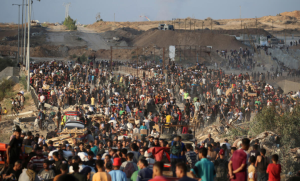
Egypt
since 2013 (Photo: MEMO)" width="300" height="200" /> Two years of terror: Death sentences in Egypt since 2013 (Photo: MEMO)Cairo, 3 Dzulhijjah 1436/17 September 2015 (MINA) – Egypt has seen seven death sentences carried out and 246 overturned, with a further 433 still subject to appeal, out of a total of 1,695 death sentences referred to the Grand Mufti since the military coup that deposed the country’s first democratically-elected president Mohamed Morsi in July 2013.
Most of the cases are related to protests against Morsi’s ouster; some are old cases that resurfaced following the coup, while the rest are “terrorism” cases with the majority of defendants being active members of the Muslim Brotherhood.
Anadolu Agency has compiled a list of all death sentences issued in Egypt in the period from July 2013 to September 2015 according, to judicial and human rights sources.
Death sentences carried out
On 17 May, Egypt’s Ministry of Interior executed six defendants accused of membership in a terrorist group in the case known as the “Arab Sharkas Cell”; the prisoners were all arrested during a raid on a house believed to be harbouring members of the Ansar Bait Al-Maqdis armed group in the village of Arab Sharkas in the north of the country.
Also Read: Syria, Jordan Condemn Netanyahu’s Visit to Occupied Syrian Buffer Zone
The death sentences were carried out after the Supreme Military Court rejected an appeal on 24 March against a first-degree ruling issued against seven defendants (including one fugitive) in October for membership of Ansar Bait Al-Maqdis and alleged involvement in the bombing of a military checkpoint in northern Cairo.
Another death sentence was carried out on 7 March against Mahmoud Ramadan after the Court of Cessation (the highest court for such cases) decided on 5 February to confirm the first-degree ruling issued on 19 May, 2014, by Alexandria Criminal Court, which sentenced Ramadan to death on charges of throwing a teenage boy off the top of a building in Alexandria.
Death sentences subject to appeal
Death sentences that are subject to appeal in the Court of Cessation have been issued against 433 defendants, including ousted president Mohamed Morsi, the first democratically-elected civilian president in Egypt. Morsi’s lawyers have appealed the death sentences issued against him in the Wadi Al-Natroun prison break case.
There is also the case over the murder of the police officer in charge of guarding the judge of Morsi’s trial, which took place on 28 February, 2014. Defendants denied the charge that they murdered the officer on his way back from work. The officer was in charge of guarding the home of Judge Hussein Kandil, a member of the panel responsible to rule in the Ittihadiya case in which Morsi is accused. On 7 September, the court sentenced to death nine defendants, including four students, for the murder of Kandil; the ruling is subject to appeal.
Also Read: UNIFIL Reports Over 7,300 Israeli Violations of Lebanese Airspace Since Ceasefire
Another case is known in the media as “contacting Daesh”: An Egyptian court in the Nile Delta area decided on Sunday to sentence 12 defendants to death for allegedly having links to the terrorist organisation. The sentences are also subject to appeal.
The Court of Cessation may decide to confirm criminal courts’ rulings, making them final, or revoke them, in which case the trial would be repeated in another criminal court that belongs to a different circuit. If the second criminal court issues a second ruling, it could be appealed at the Court of Cessation, which may accept the appeal, repeat the trial and issue a final sentence, or it may reject the appeal, in which case a criminal court’s second ruling is considered final.
Revoked death sentences
The death sentences issued against 246 defendants were revoked after their cases had already been referred to the Mufti for approval. The defendants appealed the rulings and the Court of Cessation accepted the appeal, repeated their trials and revoked the death sentences.
A further 1,009 cases that had been referred to the Mufti did not see death sentences issued against the defendants. 516 defendants were given sentences other than the death penalty, while 493 were acquitted after their appeal was accepted and trials repeated.
Also Read: Russia Condemns UN Gaza Resolution, Says It Contradicts Palestinian Statehood
The Egyptian government asserts that the Egyptian judiciary’s rulings are not politicised and the government respects Egyptian laws and the Egyptian constitution.
Since Morsi’s ouster, the ruling regime has accused the Muslim Brotherhood’s leaders and supporters of “inciting violence and terror”, while the group says that it adheres to a peaceful approach in its opposition what it sees as a “military coup” against Morsi.
On the other hand, Egyptian security apparatuses are accused of murdering thousands of protesters opposed to Morsi’s ouster in a number of high-profile massacres. (T/P002/R04)
Mi’raj Islamic News Agency (MINA)
Also Read: Israeli Airstrike on Palestinian Refugee Camp in Lebanon Kills 13









![Israeli tanks and APC’s gather by the Israeli – Lebanese border. Amid Israel’s escalating campaign against Hezbollah in Lebanon on September 30, 2024. [Erik Marmor/Getty Images]](https://en.minanews.net/wp-content/uploads/2024/10/IMG_20241001_203226-300x197.jpg)























 Mina Indonesia
Mina Indonesia Mina Arabic
Mina Arabic